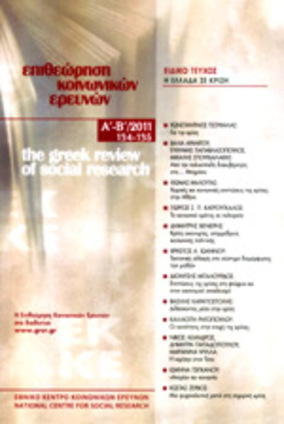The relation between new technologies and power in Greece : perceptions of people in positions of power
Part of : Επιθεώρηση κοινωνικών ερευνών ; Vol.144, 2015, pages 21-44
Issue:
Pages:
21-44
Section Title:
Articles
Author:
Abstract:
The objective of this paper is to delve into the question of whether and how the Information and Communication Technologies (ICTs) are channels through which many forms of power are being exercised. The analysis will be based on the findings drawn from interviews with persons having been appointed in powerful positions in the Greek public administration and under this role have contributed to the ICTs usage as well as, secondary written sources on public administration. The main elements of this analysis include an examination of a. the nature of power, b. the subjects in positions of power within public administration as are defined within the framework of this paper, c. the ideologies of modernisation and globalisation as vehicles to the changes incurred regarding the ICTs, and finally d. the transmission of the aforementioned to wider society.
Subject:
Subject (LC):
Keywords:
e-governance, ICTs, information society, Greece
Electronic Resources:
References (1):
- Bekkers, V. and Homburg, V. (2007). The myths of E-government: Looking beyond assumptions of a new and better government. The Information Society, 23, 373-382. doi: 10.1080/01972240701572913 Castells, M. (2009). Communication Power. Oxford, New York: Oxford University Press. Centeno, C., and Van Bavel, B. (2005). A prospective view of e-government in the European Union. The Electronic Journal of E-Government, 3(2), 59-66. Condyli, D. (2012). Les prolongements productives «de l’agir communicationnel»: le cas de la Grèce». Paris, Université Paris 8, doctoral thesis, (unpublished). Digital Economy and Society Index (2015). Country profile Greece, Retrieved from http:// ec.europa.eu/digital-agenda-scoreboard/greece (accessed on 10/1/2015). Europe in figures-Eurostat YearBook. Retrieved from http://ec.europa.eu/eurostat/statisticsexplained/index.php/Europe_in_figures_-_Eurostat_yearbook (accessed on 25/1/2015). Fontain, J.E. (2014). On the effects of e-government on political institutions. In D.E. Kleinman and K. Moore (eds), Routledge handbook of science, technology, and society (pp. 462-478), New York, Routledge. Retrieved from http://people.umass.edu/jfountai/files/Fountain_STSHandbook2014_galleyproofs.pdf Fontain, J.E. (2005). Central issues in the political development of the virtual state. Paper prepared for The Network Society and the Knowledge Economy: Portugal in the Global Context Lisbon, March 4-5, 2005. Retrieved from http://www.umass.edu/digitalcenter/research/pdfs/jf_portugal2005_centralissues.pdf (accessed on 11/12/2014). Heeks, R. and Bailur, S. (2007). Analyzing e-government research: perspectives, philosophies, theories, methods and practice. Government Information Quarterly, 24(2), 243-265, Retrieved from http://www.sciencedirect.com/science/article/pii/S0740624X06000943 Nixon, P.G. and Koutrakou, A. (2007). E-government in Europe: Rebooting the state. Routledge Advances in European politics, New York: Routledge. OECD (2011). Greece: Review of the Central Administration. OECD Public Governance Reviews, OECD Publishing, Retrieved from http://dx.doi.org/10.1787/9789264102880-en (accessed on 10/12/2014) Sotiropoulos, D. (1995). The remains of authoritarianism: Bureaucracy and civil society in postauthoritarian Greece. Cemoti, 20, Retrieved from https://cemoti.revues.org/1674 Standard Eurobarometer 80 (Autumn 2013). Media Use in the European Union. Retrieved from http://ec.europa.eu/public opinion/inndex.en.htm Webster, F. (2006). Theories of the information society (3d edition), New York: Routledge. Yildiz, M. (2007). E-government research: Reviewing the literature, limitations, and ways forward. Government Information Quarterly, 24(3), 646-665.




